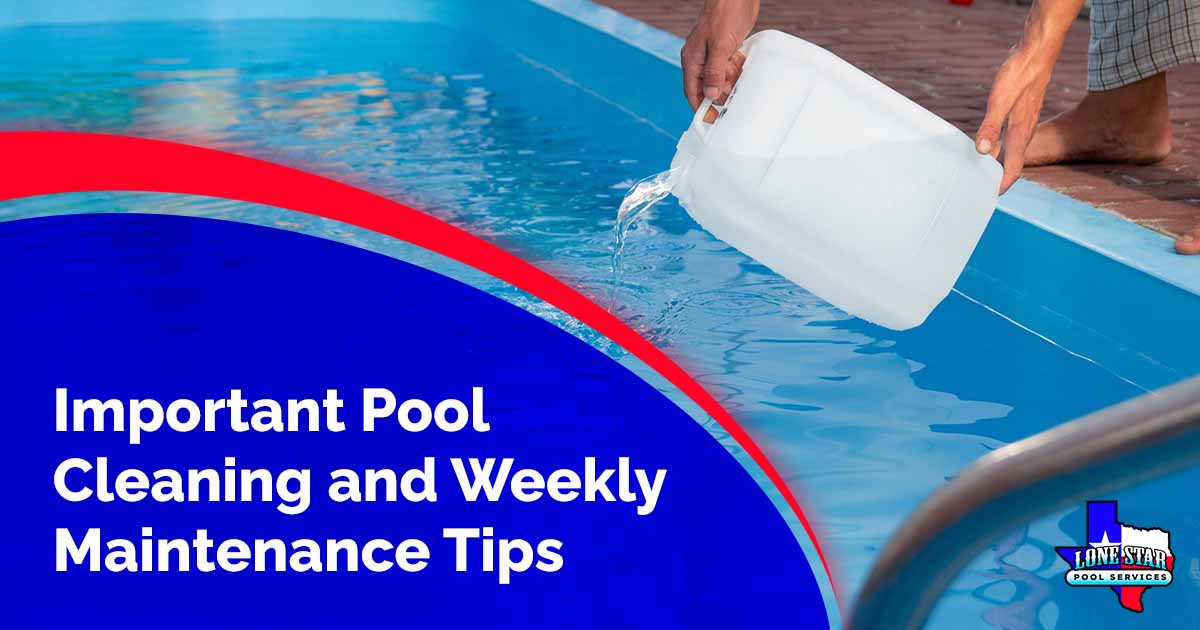Pool cleaning is an important part of pool ownership. Many people love the thought of owning their own swimming pool, but they don’t realize how much care a pool requires. The maintenance requirements alone are why many pool owners choose to outsource their pool care. Hiring a professional pool cleaner can save you time and money in the long run.
At Lone Star Pool Services we understand the requirements of pool ownership. Our staff is expertly trained on the maintenance and care required by swimming pools of all kinds. We are happy to share our knowledge to ensure your pool is a happy, healthy place you can enjoy with your friends and family.
The Importance of Regular Pool Cleaning
Water balance is the most important aspect of swimming pool maintenance, but it’s also one of the most confusing. Balancing your water’s pH levels is complex, but necessary. Balanced water ensures the swimming pool is comfortable, safe, and corrosion free.
An unbalanced pool pH is a breeding ground for germs and bacteria. In addition to risking the health of your swimmers, unbalanced pool water also has a negative effect on your skin and eyes. Without the proper balance the pool can do more than harm swimmers, it can actually harm itself. Imbalances can lead to corrosion to the liner, rails, ladders, pump, and anything else the water touches.
The pH levels of your pool need to be within a specific range for an enjoyable and beautiful pool. The ideal pH level is between 7.4 and 7.6 on the pH scale. If your water tests fall between 0 and 7 then the pH balance is low. A low pH means chlorine will dissolve more quickly. A high pH, one that falls between 8 and 14, means chlorine will be inactive.
You also must take alkalinity into account. Total alkalinity, or TA goes hand in hand with the pH level. If your pool has a high alkaline level then the pH level will also be high. If you have a low alkaline level then the pH level will also be low. Ideally, the alkalinity reading should be around 100 ppm.
In addition to pH and TA, you also need to keep an eye on your pool’s calcium hardness. Too little calcium will erode the plaster in your swimming pool. Too much calcium results in cloudy water which, in turn, could result in stains. The typical calcium hardness level is between 200 to 400 ppm, the ideal level being around 300 ppm.
Weekly Swimming Pool Cleaning
A weekly thorough cleaning during swimming season keeps your pool clean and safe. It’s important to skim insects, leaves, and other debris from the surface of your pool using a skimmer. It is much easier to remove these things when they are floating on top of the water than it is to remove them after they’ve sank. Allowing debris to sink to the bottom of your pool can also result in staining.
Dirt will gradually collect on the bottom and sides of your pool. Using a long brush you can push the sediment toward the pool’s main drain for easy vacuum removal. Vacuuming is a requirement for any pool. Many pool owners choose to use an automatic pool cleaner, however, it can also be done manually using basic pool cleaning equipment. If you have automatic pool cleaning equipment you must clean it out weekly. Depending on the equipment itself, you may need to clean it more often for it to operate to its best ability.
Every week you should make it a point to check your pool’s circulation system. This includes the pump, pump strainer, skimmer, drains, and the filter. The system must be clear of debris and circulating water properly to allow chemicals to maintain balance throughout the pool. There are three popular pool filter types. Follow your filter’s directions in order to ensure it is operating as designed.
It’s also important to test your pool water often. If you use your pool regularly, you’ll want to check the levels daily. This allows you to add the necessary chemicals to ensure proper water balance. In some instances you may need to shock your pool to clean the water of bacteria, dirt, algae, and anything else. There are many different shock treatment available. It’s important to always follow the instructions.
Around the Pool Cleaning
It’s equally important to clean the area surrounding your swimming pool. The deck or patio around the pool should be disinfected regularly. This helps prevent the spread of germs, bacteria, and disease. Bacteria growth can also cause the surface surrounding the pool to become slippery and dangerous. The actual process of cleaning this area will vary depending on what type of material is surrounding your pool. However, every surface should be cleaned regularly. If you have a small pool deck you’ll be able to clean and disinfect the area by hand. However, larger decks may require a pressure washer to save time.
Another important aspect of weekly pool maintenance is inspecting the pool equipment pad. The equipment pad needs proper drainage and care. Check to ensure the equipment is free from debris, including overgrown weeds, leaks, and excess water. Pump and heater vents should be clear of any vegetation. You’ll also want to inspect all gauges and conduits to ensure they are in working order and not cracked. In addition to ensuring everything is in good shape, you’ll want to read the gauges to see if everything is at the ideal level.
Hiring a Pool Cleaning Service
Due to the complexity of required pool care, many pool owners choose to hire a professional for all of their pool maintenance needs. This provides the pool owner more time to enjoy the swimming pool with their friends and family. An expert can also ensure the water is properly balanced for an enjoyable swimming experience.
Lone Star Pool Services has a professional staff that can help you with your weekly pool cleaning needs.

